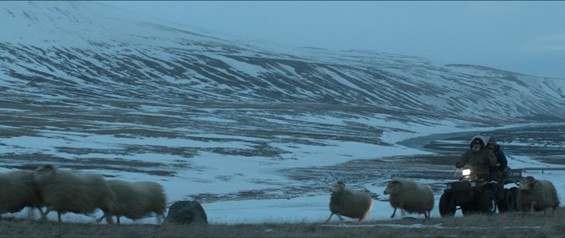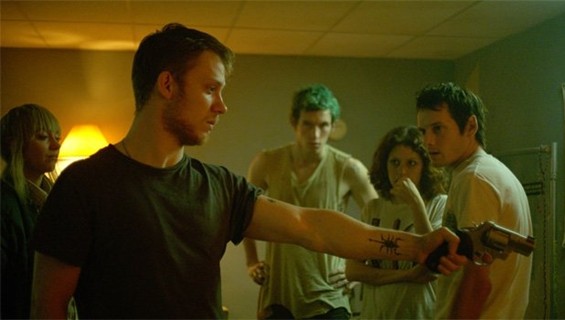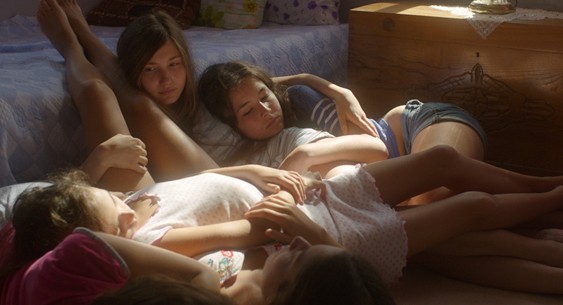
To read part one of Selina’s coverage, click here.
Young Argentinean director Santiago Mitres sophomore feature Paulina played early on in Critics Week and has now been given the Grand Prix. A re-make of Daniel Tinayre’s La Patota (The Gang) from 1960, its asocial drama that asks complex questions from its audience; questions that were not easily answered for me, as a female spectator. The absorbing story follows PhD student Paulina (Dolores Fonzi) forgoing her studies to become a lawyer instead to teach in a rural school close to the border of Paraguay, a region where the affects of deforestation are immediately apparent. One night on her way home she is attacked and raped by a gang of young men who she later realises are her students. Rather than deciding to prosecute her perpetrator (whom she quickly singles out), she chooses to stand by her radical political idealism and refuses to cooperate with the police and, significantly, her overbearing father, a well-connected judge. Dolores Fonzi physically inhabits the character of Paulina (similar to Michelle Williams performances in Kelly Reichardt films), a whip smart and stubborn young woman who literally thinks through her political ideals with and on her body. Paulinas final decisions make for uncomfortable viewing, and leave me with a question that had this story been written by a woman (instead its adapted from the original screenplay by Daniel Tinayre), would Paulina have put the personal over the political?

Yorgos Lanimithos’ The Lobster, starring John C. Reilly, Colin Farrell and Ben Wishaw, proved an early critical hit at Cannes
Another title that I was looking forward to (and had to work for, spending 2 hours in the queue) was Greek weird waver Yorgos Lanthimo’s Orwellian drama The Lobster. Partly funded by the BFI and the Irish Film Board, the film is Lanthimos’ first English-language film since his relocation to London. Set in a sinister countryside hotel (managed with an iron fist by Olivia Coleman) where singletons are sent in order to find a mate in 45 days; if they fail they will be turned into an animal of their choice. This is a joyfully barmy idea that posits questions about contemporary culture’s obsession with coupledom and the nuclear family. The film plays in two parts: strange happenings and bizarre human (mating) rituals in the hotel (Ben Wishaw is especially good as The Limping Man) and then killing games in the forest, with the outsiders headed up by a poncho wearing Lea Seydoux as Loner Leader. A particularly paunchy Colin Farrell plays David, an everyman who asks to be turned into a lobster if he fails to find his true love. That true love, which turns out surprisingly tender, comes in the form of Rachel Weisz, an outsider fighting for her life. The joy of Lanthimos’ films is their free interpretation, and as with his previous work Dogtooth and Alps, he explores ideas around power structures, intimacy and human connections. Shot in a familiar performative/artificial manner with mannered dialogue and cold eroticism, it’s interesting to watch these purposely alienating Lanthimos’ tropes translate into an English-language film with recognizable actors/actresses. Whilst the film might not win over any new converts to ‘the cult of Lanthimos’ (as I overheard in one queue), The Lobster is a brazen outsider film made for multiple viewings and investigations.

Rams, playing in Un Certain Regard, was the Icelandic film in Cannes this year. Given that the Icelandic Film Centre only fund about 5 features a year, this was hardly surprising. The film plays directly to the same audience for Of Horses and Men (last years Icelandic audience pleaser) and has the same lead actress, Charlotte Hoving. However, Rams setting of a remote Icelandic farming valley and two elderly feuding brothers is a much more paired-down affair. Director G Gormur Hokonarson is a seasoned documentary filmmaker and has tasked himself with dutifully capturing a deeply-rooted rural way of life,the weather, the daily rhythms of farming and the expansive landscape that is closely connected with the Icelandic national spirit. There were aspects of the film that reminded me of Gideon Koppel’s sleep furiously (2009). Not without some dry, wry Scandi humour, the films combination of landscape, sound and vintage sheep acting make for a rich and rewarding viewing. Thumbs up that the film was awarded the Un Certain Regard Prize, it’s great news that Soda Pictures have acquired it for UK release.

Son of Saul was a towering piece of cinema that was given the Grand Prix at Cannes closing ceremony on Sunday night. A debut film written and directed by 38-year-old Hungarian Lazlo Nemes (former assistant of Bla Tarr), this was the film that made the biggest impression on me. Set in Auswichtz in 1944, the drama centres on a fictional member of the Sonderkommandos (Jewish workers who were forced to carry out the daily atrocities of mass murders). A Hungarian man called Saul decides that he must find a rabbi to give a young boy, who might be his son, a proper burial. There is really interesting Guardian interview with the films lead actor Goza Rhorig who is a poet and a teacher and first-time actor.
The film takes place over a day and a half, and is mainly shot in close up. I’ts an intensely immersive cinematic experience that I was 100% invested in from the start; it reminded me of the feeling I had when I first watched Wolfgang Petersons anti-war drama Das Boot (1981). As the critics have rightly suggested, the film creates a new Holocaust narrative and rightly signals what cinema can achieve, its potential, in creating radical new interpretations formally and through storytelling.

I made a mad dash along the Croissette with my fellow ICO-er Jemma to join another ICO-er Duncan who was sacrificially withering in the sun waiting in line to watch Jeremy Saulnier’s Green Room. This was the hotly-tipped follow-up to Saulnier’s debut feature Blue Ruin. Green Room is a violent crime/thriller about a cash-strapped punk band who are paid to do a gig at an unsavoury neo-Nazi club. After the gig, a murder takes places that catapults the band into a kill or be killed situation. The film has heaps of violence and plenty of twists and turns to keep genre fans happy. With an eclectic cast of Imogen Poots (great skinhead haircut), Alicia Shawkat (Arrested Development) and Patrick Stewart as leader of the neo-Nazi pack, the film will play really well to a (younger) genre-loving audience and many late night movies slots. Personally, I found the film a little over-hyped but from the Cannes audience reaction, I realise I was in the minority.

German national but French new-waver Barbet Schroeder has had an eclectic career to say the least – from the ’70s sado-masochistic drama Matresse to 90’s Hollywood psycho-femme thriller Single White Female to more recently directing an episode of Mad Men, as well as starting up Les Films du Losange when he was just 23 years old, Schroeder has a distinct position straddling European arthouse and the Hollywood studio system. His latest film Amnesia, exploring German memory and history, is an interesting premise to say the least as the story is based on his mothers life, who moved to Ibiza after the war (along with other intellectuals like Roland Barthes). She, as did many others of that generation, vowed to never speak German again. Schroeder calls this a culture of refusal. The story is set in the early 90’s and follows an older woman who meets and finds herself falling in love with a young German DJ who has moved to Ibiza to be part of the growing club scene. The film is immaculately shot (with natural light) and edited, but for me the performances,except for Max Riemelt as the rookie DJ, were wooden, theatrical and a little old fashioned. Part of the problem is that most of the dialogue, because of the politics of the film, is in English, the affect being that acting felt somewhat removed or displaced. However, there is plenty to enjoy in the gorgeous geographical setting and light of Ibiza with the traditional Ibiza finca (which is Schroeder’s mothers real house) plays a prominent role in the film. I’m not too sure if this film will pop up in UK distribution, which is a shame, as its a film that deserves to be watched in the cinema.

How happy was I to see that lead actress Emmanuelle Bercot was given the Best Actress Award for her blisteringly good performance in Mawenn’s (Polisse) competition drama MonRoi. The film took quite a battering from UK critics but I really like the film, because this was a very affecting melodrama told from a distinctly woman’s point of view: a courtship, marriage and break up that shows how love lives can be messy and complicated. How refreshing is that? Emmanuelle Bercot plays Tony, a high-achieving lawyer, who falls in love with restaurateur and jack-of-all trades Georgio (a brilliant Vincent Cassel). She falls for him hard, they get married but Tony is a man-child unable to grow up. The films title Mon Roi – My King, perfectly sums up her relationship to this man who is so destructive for her because she has to put him before herself in order for the relationship to work. Mawenn’s breathes new life into this familiar tale of broken love and together with her DoP Claire Mathon (Stranger by the Lake) cinematically delivers the deep emotional and immersive journeys that Tony has to travel on. Watch out for a StudioCanal release late in 2015 or 2016.

My final film of the festival came by way of a recommendation, which is always the best way, a Turkish coming-of-age comedy/drama called Mustang. I caught the film on my last morning with fellow ICO-er Hatice. A debut feature by Denis Gamze Ergven, co-written by Alice Wincour (Disorder), its a life-affirming story about five free-spirited sisters who live on the coast of Turkey, whose lives revolve around being teenagers (boys, make up, sunbathing) which would be fine if they lived in Istanbul but instead they live in a conservative, traditional household with their grandmother and uncle acting as their guardians. Even though the films script does have a few holes in it, and at times the story points in the direction of an on-the-nose cultural critique between modernising and traditional Turkey, the strength of the film is the infectious and refreshing performances from the five young actresses, especially Gunes Sensoy as the youngest and punkiest sister Lale. I loved the films unadorned celebration of the spirit of girlhood and the audience did too, I would be surprised if this film was not picked up for UK distribution.

